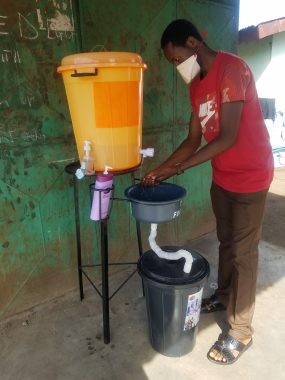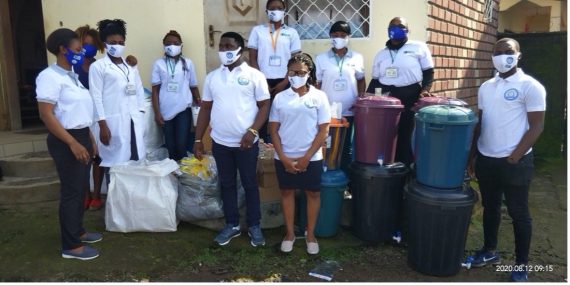Meridian Global University’s Health Care for Internally Displaced Persons in Cameroon to Mitigate the Impacts of COVID-19 (Cameroon)
 The partnership between Meridian Global University (MGU) and Access Care Foundation addresses urgent healthcare needs in areas that have been affected by Cameroon’s five-year long armed conflict in the Anglophone Region. The project employs MGU health students and Access Care Clinic staff to provide home-to-home community services such as education on proper hygiene and sanitation, mass distributions of long-lasting insecticidal nets, and malaria prophylaxis to pregnant women, and many other free health services such as screenings, testing, and treatments of common diseases.
The partnership between Meridian Global University (MGU) and Access Care Foundation addresses urgent healthcare needs in areas that have been affected by Cameroon’s five-year long armed conflict in the Anglophone Region. The project employs MGU health students and Access Care Clinic staff to provide home-to-home community services such as education on proper hygiene and sanitation, mass distributions of long-lasting insecticidal nets, and malaria prophylaxis to pregnant women, and many other free health services such as screenings, testing, and treatments of common diseases.
The partnership was established in 2017 due to the urgent need for basic healthcare services for those trapped or displaced by the armed conflict. Recognizing that MGU and Access Care had a common interest in addressing these health care needs, they formed a partnership in which MGU provides personnel (final year health students) and financial support for the purchase of testing kits for malaria, HIV, blood pressure and blood sugar, while Access Care provides expert health personnel, antimalarial drugs, long lasting insecticidal nets, family planning kits, and vaccines.
The project’s primary challenges have been the many barriers to accessing those in need of urgent medical care, including COVID-19 restrictions and the Anglophone Crisis. Armed conflict between separatist fights and the government has resulted in population displacement, leading to poor hygienic circumstances that perpetuate various diseases such as malaria, diarrheas, and respiratory tract infections. This issue is further exacerbated by COVID-19. Dr. Elvis Akomoneh of MKU noted, “The precarious living conditions in bushes or slums are characterized by overcrowding, poor sanitation and lack of good water supply.” Accessibility is further made difficult due to distrust of health care professionals amid the divisive political turmoil and regular lockdowns that prohibit movement.
Impacts
Fortunately, the project has seen tremendous successes. Dr. Akomoneh describes the positive results of the partnership: “We currently observe a more than 70% reduction in the number of cases of malaria related hospitalizations within the population, less than 1% of pregnant women with malaria and 0% malaria related miscarriages.” Additionally, the project has observed a 90% reduction in cases of unwanted pregnancy and “less than 5% incidence of COVID-19 infections within the target population in the last three months.”

MGU developed strong community partners with similar objectives across a wide variety of sectors including non-profits, government, and local community-based organizations. Dr. Akomoneh also highlights the impact of the University Award community of practice, emphasizing the exposure to different perspectives and challenges and incorporating lessons learned from their colleagues into their own methods.